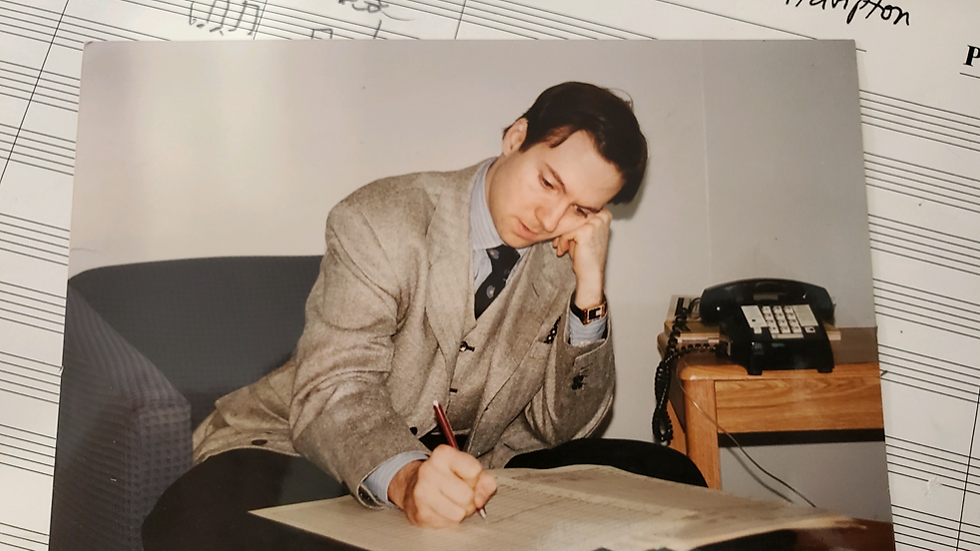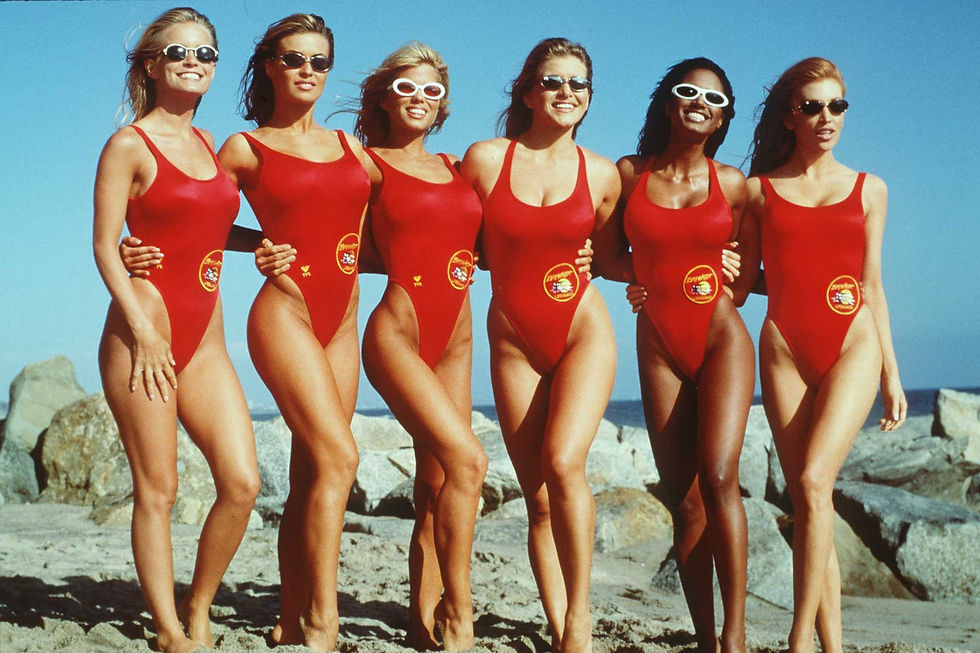Getting philosophical with Snapshots,Books and Beaches
- Mitch Hampton

- Aug 1, 2022
- 7 min read
August is, of course, a central month in the Summer.
In the past year I have been organizing all of my personal effects, mainly documentation of my life as an adult until now. When I had to move quite suddenly, pre-pandemic, I got rid of many things I should not have in a harried rush of duress. Though many important things were lost I did exercise some organizational skill and was able to hold onto some essentials. A few photographs remain of my life in the 1990s and early 00s, and a couple of them are of me on a beach with books which is a traditional Summer activity for many people.
Now these are literal snapshots of me.
I have been told from at least two relatively authoritative sources - one most scientific, and one metaphysical, mystical (or "woo") that I am unusual in my core character in that I have two sides that cannot be acted upon or had together at the same time, but indeed, are opposite enough to one another that I must alternate or pursue one of these two sides at different times.
One is what you would call intellectual, scholarly, perhaps a little ascetic and very bookish and curious. (For some reason I am reminded of Olivia Wilde's wonderful teen picture whose very title is a reference to this sensibility: Booksmart.)

The other side is fun loving, pleasure seeking, a little hedonistic and sensual. As I write this blog post for the month of August, of course, this second side is represented by this time of year.
We associate the Summer with pleasure and leisure although, interestingly, the last time I wrote about this month I wrote of a popular novel by Judith Rossner about a psychiatrist and her patient titled August, and the content of that novel was quite serious and profound - the notion of "beach reading" notwithstanding.
Yet while there are some dual matters in life that literally cannot be had at the same time and you sort of have to pick one at a time - I am forever charmed by Isaiah Berlin's quip about setting one's watch to a time to become spontaneous - an organization of some photos of my life from the 1990s (!) serves to illustrate that a setting or an environment can perform quite diverse purposes.
This first photo is of me literally writing my rather short American Symphony in a hotel room in 1995.

You can see in that motel photo that I also had hair then. The furnishings in this motel are all of the kind of mid level motel aesthetic you would find in that era - for example a puffy polyester chair, and a phone from a pre-digital era, and the ever present blonde wood.
Now the whole issue of mass production designs is most important to aesthetics yet so rarely discussed. This is the issue of how the suburbs were built and the aesthetic decisions that are made for a motel, an office, a strip mall, indeed the fact that there even is a strip mall.
If you look at the second photo however you see this is from the same few days and my motel was on a beach in New England. Given that these photos are from 1994 or '95 I would have been in my late 20s! These are rare snapshots of me at "leisure".
And like millions of other people I would bring books to the beach.

At that time I was reading Eric Hobsbawn's Age Of Extremes and Anne Morrow Lindberg's Gifts From The Sea. There were about there or four other books, too that you can't really see in these photos.
Books to me are like solid food and the books I sort of like to be solid too, with volume and mass.
Basically I decided to rent a motel room on the beach took a portable keyboard and headphones, and compose this music for a deadline. What you would not know from these photos however is that these were NOT from the Summer. I would go to this location in very early Fall or early Spring, to take advantage of the discounts and the lack of crowds.
The symphony I wrote was eventually recorded by no less than Abbey Road Studio in London by the London Symphony Orchestra. The 90s were personally good years for me, far better than in the years from 2017 until now, this podcast being an interesting exception.
I have also included a photo of me and an unknown man who talked a lot about having been one of the "hell's angels" in the 1970s.

I enjoyed his stories immensely.
It is one of the most revelatory and indispensable parts of the "snapshot" approach, which can only be helped if you have the modicum or organization to save what is important from what is unimportant - like a documentation of composing a symphony or how one looked in one's twenties and thirties which are objectively so important a time in any individuals life.
Now that you do with such documentation will vary widely -and, maybe wildly - depending on the nature of your lifestyle. Are the older snapshots or documents of a life full with people, such as those with families or busy workplaces?
Or are they, as in the case of yours truly, snapshots of a person attempting to do as much as they can with actually very little in the way of close relationships, and without families of their own or kids.

Another important thing, of course is to love oneself, which does not mean denying or disavowing past mistakes, however serious.
I always have to clarify when I discuss my snapshot theory that it includes wrought objects that have years of hard work behind them as well as objects that are immediate and instantaneous. I also hasten to add that documentation of individual lives or a time and place, even a whole era, is only one of the many purposes or themes in art, which in itself can't be reduced to sociological matters like eras or histories.
I have long had a fascination with the Sam Elliott movie directed by Daniel Petrie named Lifeguard. If you recall my post from wayback in 2020, titled A Style Of One's Own, one single scene from that film inspired my musical development.
From a distance I have often imagined having lived a radically different life than the one I have chosen, one oriented around athletics, even swimming and physical activity more generally.
In this scenario maybe I was a lifeguard who got to to date a woman like the Anne Archer character in that movie or was a heartthrob on a beach. I am always amused that on the show Baywatch the David Hasslehoff character is named Mitch, a character with whom I appear to have practically nothing in common save for biological maleness and heterosexuality. Some analysts even feel that the specific design of the Baywatch one piece swimsuit is an icon of modern fashion aesthetics!

The greatest movies ever made "about" or in the environment of the beach are from filmmaker Eric Rohmer, in particular Le Rayon Vert, even more so than Pauline At The Beach. I would have to do an entire post on this one film to do Le Rayon Vert justice.

Since I have spent so little time on actual beaches in real life I like to watch artwork about them perhaps as compensation.
I see commercial works of art not as oppressive ideologies to be overcome or critiqued (they can be these too, but I always say there is some good in all commercial and high selling works of art, setting aside their considerable flaws) but sources of pleasure, entertainment, comfort and even knowledge of how the world actually works. It is like learning about one's culture and what the statistically average person is likely or unlikely to do in terms of behavior.
Actually I will be boldly provocative and say that this function is universal and that all human beings need help in understanding the basic functions and rules of their society and only after having comprehended and integrated these can there even be a consideration, a discussion or actualization of changing what one does not like in them.
Art has always been one of the main ways of accomplishing these goals.
In this sense I am both for and against traditions. It is always better to know a tradition since it can be like a language or a foundation and as we all know languages and foundations are important. Yet it is always also good to hold these traditions lightly and be open to going outside of them. For example in my music I uphold the tradition of tonality; yet I never feel this is a restriction and at times I feel do so much with this and my usage of tonality bears rather little relationship with what that word would have meant in the nineteenth century.
We can invent new things that have features that are quite old as much as they are new and the best is to do so in conscious rejection of going back to anything. It is not accidental that all the worst social movements use words like back and again, as if the past is simply innocent goodness.
Of course the opposite attitude, which we hear from those that call themselves radical, that the past is simple one long nightmare, is just as mistaken. We can preserve the best traces of the past (and to be fair these continue to exist whether we like it or not) and condemn what was wrong in the past at one and the same time.
I want to clarify further upon this comment.
Practically every past era or time was a mixture of both good and bad elements and, I would argue, in close to equal measures. This means that there is as much we should reject from the past or attempt to transform (transcend?) as there are things that are good that should e continued.
This is further complicated by my own admitted relativism with regards to many social questions such that it depends on the tastes or sensibilities of who you ask concerning any aspect of the past. And by this it means it depends on what is important to you.
And what is important to you will inevitably differ from the person next to you - even if you have identical backgrounds and life experiences!










Comments